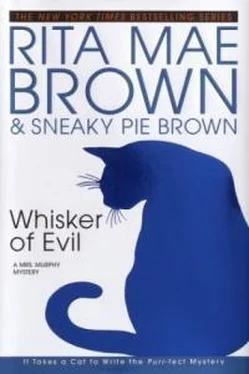“What about fox or coyote?” Harry asked.
“Negligible. Only 5.4 percent of reported cases are foxes and coyotes. And the numbers are going downward. Oddly enough, we’ve seen a spike upward in sheep and cattle. Not enough to be alarming, and it may just be that farmers and ranchers out west are becoming better at reporting symptoms. Also, I think in many ways people are becoming more environmentally responsible. In the old days if a fellow had a sick cow he’d shoot it. If it was found dead he’d not get an autopsy. Today he might call the vet. It’s one of the reasons we’ve been able to slow this disease and to just about stamp it out in pets.”
“If Barry was bitten by a raccoon or a skunk, wouldn’t he notice? Wouldn’t he go to the doctor?” Harry’s mind was whirring along.
“Who said he knew he was bitten? It could have been a bat, too, and those bites are so tiny you don’t see them most times and you don’t feel them, although a numbness at the site of infection is often a signal.” Fair laid down his hammer on the floor of the gazebo. “Bats get a bad rap about carrying rabies, but the percent of humans bitten by rabid bats is tiny.” Cooper started to speak, but Harry jumped in.
“If the rabies was in Barry’s brain tissue, then he had it for at least thirty days, right?” Harry jammed her hands in her jeans pocket.
“That’s a safe assumption. He displayed no symptoms yet. Or did he?” Fair looked at Cooper.
“Everyone we’ve questioned said he behaved normally. So he—I think the word is presented—he presented no symptoms.”
“What are they? All I know is foaming at the mouth.” Miranda was worried.
“That’s the stereotype, but the progress for humans is that they feel flu-y, headachy. That might last for a couple of days. They run a fever, and this provokes anxiety, agitation, and confusion. By now, if you know the person, you know something is not right. They aren’t acting normal. Finally they become delirious, completely abnormal. Some become enraged and others sink into a torpor. And some people and some animals do foam at the mouth, but that’s because the virus leads to dehydration, and almost every animal foams at the mouth when it’s hot and thirsty. That’s why that’s such a misleading concept.”
“And it’s always fatal?” Miranda said.
“Always. Once the symptoms appear, it kills you within two to ten days, and it’s a hideous death. At least today we can somewhat comfort the person, knock them out with drugs. But,” he blinked, “it’s an ugly, ugly way to die.”
“No one has ever survived. Really?” Cooper wondered.
“There are five reported cases, and in four of those the people had had the vaccine shots but not the treatments after exposure. Every veterinarian has the preventive vaccines but we all know, if we’re bitten, we still need the shots. You might survive rabies infection if you’ve had the prophylactic series of shots. You’re taking a chance, but you might survive.”
“What about the other survivor?” Cooper sat on a gazebo step.
“I’m not sure, but I think it was early in the twentieth century, someone in Brazil. Which reminds me, rabies is epidemic in parts of Latin America and Asia. They don’t vaccinate pets like we do and they also don’t neuter like we do. If you’re going to any places like that and you’ll be outdoors a lot or on a farm, you should get the prophylactic shots.”
“How many people died in the United States from rabies last year?” Harry liked facts.
“None.” He smiled. “Thirty-two people were exposed, got the treatments, and were saved. It’s been years since a human died of rabies from a bite in our country.”
“Maybe.” Harry was skeptical.
“What do you mean?” Cooper squinted into the sun.
“It’s possible that someone died of it and was asymptomatic. Who would know?” Harry continued. “When an autopsy is performed, sending brain tissue for a rabies test isn’t a regular occurrence.”
“Could be. But even so, wouldn’t be but one or two.” Fair conceded her point.
“Maybe Barry was asymptomatic,” Miranda said.
“I doubt it, Miranda.” Fair felt sorry for the deceased man. “There was a case where a man was bitten and the presentation of symptoms did not occur for five years. But like I said, one to three months is the norm. He just hadn’t had enough time.”
“No bite marks on the body other than his throat?” Harry remembered only too well how he looked.
“No.” Cooper shook her head. “And here’s the scary part.” They collectively held their breaths for a moment while she told them. “His throat was ripped out by short tongs or a jagged-edge knife. It wasn’t a wild animal.”
“What?” Fair couldn’t believe it.
“Someone bites him and he doesn’t fight back?” Harry was flat-out amazed. “That’s not going to happen. Not with Barry Monteith.”
“He was drugged. We asked Yancy to go over his corpse with a fine-tooth comb when we brought him in, and there were no marks, needle marks. He ingested Quaaludes. Whether he did this willingly or was purposefully drugged, we don’t know. He would have been a limp noodle. Whoever wanted him dead wanted to make us think it was a wild animal.”
“We’ve lost all this time and he’s gotten away.” Harry almost wailed. “The killer just dusted us!”
“Good God, who would even think of something like that?” Fair mopped his forehead with a red kerchief.
Harry collected herself. “It would be someone who didn’t want to run away. I was wrong. He hasn’t dusted us.”
“He’s sure gotten us all confused.” Miranda noticed the three animals emerging from underneath her prized roses. “Do you have your rabies tags?”
“Mine’s on my collar, as you well know,” Tucker answered.
“We’ve had our shots. Mom has the paperwork and so does Dr. Shulman,” Mrs. Murphy, very disturbed at this report, informed Miranda.
“They’ve had every shot and pill possible. Their medical records are better than mine.” Harry smiled as Pewter rubbed against her leg.
“How do you know that Barry wasn’t bitten by a bat?” Miranda asked Cooper.
“He was. The various strains of rabies can be identified. The strain identified was from a bat,” Cooper simply stated. “They look in those microscopes, get gene sequences, and tell you if it’s bat, a dog from Asia, or one from Latin America. They can tell just like they can tell different strains of influenza. I started to tell you that when Fair mentioned bats, but I got sidetracked.” Cooper smiled, as she didn’t want to say Harry more or less cut her off.
“So Barry would have died—no matter what. What a sad, sad thought.” Miranda quoted scripture, First Corinthians, Chapter 15, Verse 22, “For as in Adam all die, so also in Christ shall all be made alive.” She paused. “He’s with the Lord. I know we should rejoice, but such a young man. It’s hard to see him go.”
“Yes, it is.” Cooper agreed. “And knowing that he was murdered doesn’t make it any easier.”
“Okay, he was murdered.” Harry reached for her nail gun. “It doesn’t make a bit more sense than when I found him. No tracks. And Fair and Susan and I walked along Potlicker Creek for two and a half, maybe three miles, heading upstream. If there’d been footprints or tire prints we’d have seen them.”
“You didn’t tell me.” Cooper narrowed her eyes, for Harry loved to stick her nose in a mystery.
“Oh, we’re kind of looking around because of Mary Pat’s ring. Big Mim said if it was in the creek, Mary Pat might have been upstream, you know.”
“She could have lost that ring foxhunting, Harry, not when she went missing.” Miranda thought of the number of ways that ring might have slipped off Mary Pat’s finger.
Читать дальше












